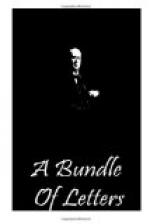You know I have always been intensely interested in Balzac, who never shrank from the reality, and whose almost lurid pictures of Parisian life have often haunted me in my wanderings through the old wicked-looking streets on the other side of the river. I am only sorry that my new friends—my French family—do not live in the old city—au coeur du vieux Paris, as they say here. They live only in the Boulevard Haussman, which is less picturesque; but in spite of this they have a great deal of the Balzac tone. Madame de Maisonrouge belongs to one of the oldest and proudest families in France; but she has had reverses which have compelled her to open an establishment in which a limited number of travellers, who are weary of the beaten track, who have the sense of local colour—she explains it herself; she expresses it so well—in short, to open a sort of boarding-house. I don’t see why I should not, after all, use that expression, for it is the correlative of the term pension bourgeoise, employed by Balzac in the Pere Goriot. Do you remember the pension bourgeoise of Madame Vauquer nee de Conflans? But this establishment is not at all like that: and indeed it is not at all bourgeois; there is something distinguished, something aristocratic, about it. The Pension Vauquer was dark, brown, sordid, graisseuse; but this is in quite a different tone, with high, clear, lightly-draped windows, tender, subtle, almost morbid, colours, and furniture in elegant, studied, reed-like lines. Madame de Maisonrouge reminds me of Madame Hulot—do you remember “la belle Madame Hulot?”—in Les Barents Pauvres. She has a great charm; a little artificial, a little fatigued, with a little suggestion of hidden things in her life; but I have always been sensitive to the charm of fatigue, of duplicity.
I am rather disappointed, I confess, in the society I find here; it is not so local, so characteristic, as I could have desired. Indeed, to tell the truth, it is not local at all; but, on the other hand, it is cosmopolitan, and there is a great advantage in that. We are French, we are English, we are American, we are German; and, I believe, there are some Russians and Hungarians expected. I am much interested in the study of national types; in comparing, contrasting, seizing the strong points, the weak points, the point of view of each. It is interesting to shift one’s point of view—to enter into strange, exotic ways of looking at life.
The American types here are not, I am sorry to say, so interesting as they might be, and, excepting myself; are exclusively feminine. We are thin, my dear Harvard; we are pale, we are sharp. There is something meagre about us; our line is wanting in roundness, our composition in richness. We lack temperament; we don’t know how to live; nous ne savons pas vivre, as they say here. The American temperament is represented (putting




